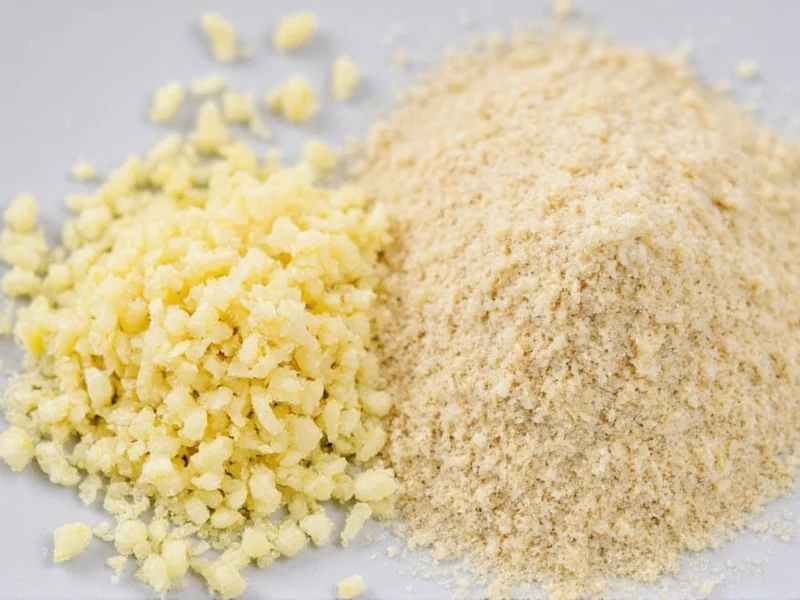Many home cooks assume granulated garlic and garlic powder are interchangeable, but this common misconception can affect the flavor and texture of your dishes. Let's explore the key distinctions between these two pantry staples to help you make informed choices in your culinary creations.
Physical Characteristics and Production Process
The primary difference between granulated garlic and garlic powder lies in their particle size and moisture content. Both start as fresh garlic cloves that undergo dehydration, but the processing methods diverge at the final stages.
Garlic powder is created by dehydrating garlic cloves until they're completely dry, then grinding them into a fine, flour-like consistency. This process removes nearly all moisture (typically less than 6.5%), resulting in a product that flows freely and dissolves relatively quickly.
Granulated garlic, by contrast, undergoes partial dehydration. The garlic is dried but not to the same extent as powder, then processed into small, sand-like granules. These granules retain slightly more moisture (usually around 8-10%) and have a coarser texture that doesn't dissolve as readily as powder.
| Characteristic | Garlic Powder | Granulated Garlic |
|---|---|---|
| Particle Size | Fine, flour-like (0.1-0.3mm) | Coarse, sand-like (0.5-1.0mm) |
| Moisture Content | 5-6.5% | 8-10% |
| Dissolution Rate | Dissolves quickly in liquids | Dissolves slowly, retains texture |
| Flavor Intensity | Stronger, more concentrated | Milder, more subtle |
| Shelf Life | 18-24 months | 12-18 months |
Flavor Profile Differences
Understanding the flavor differences between granulated garlic and garlic powder is essential for recipe success. Due to its finer texture and lower moisture content, garlic powder delivers a more intense garlic flavor. When measuring by volume, you'll need approximately 25% less garlic powder than granulated garlic to achieve equivalent flavor.
Professional chefs note that granulated garlic provides a more gradual release of flavor during cooking, making it preferable for dishes with longer cooking times. The slightly higher moisture content allows it to integrate more smoothly into wet ingredients without creating clumps.
Garlic powder's fine texture makes it ideal for dry rubs and spice blends where uniform distribution is critical. Its stronger flavor profile means it can sometimes overpower delicate dishes if not measured carefully—a common issue when home cooks substitute one for the other without adjustment.
Practical Substitution Guide
When substituting between these forms, precise measurements matter. The difference in particle size and density means you can't use a 1:1 ratio. Here's a reliable substitution guide for is granulated garlic and garlic powder the same in recipes:
- To replace 1 teaspoon granulated garlic: use ¾ teaspoon garlic powder
- To replace 1 teaspoon garlic powder: use 1¼ teaspoons granulated garlic
For dishes requiring quick dissolution like salad dressings or marinades, garlic powder works better. Granulated garlic shines in slow-cooked dishes like stews or braises where its gradual flavor release enhances the final product. When making garlic powder vs granulated garlic for seasoning meats, the powder creates a more uniform coating while granulated provides subtle texture.
Culinary Applications and Best Uses
Chefs recommend specific applications for each form based on their properties:
Garlic powder excels in:
- Dry rubs for meats and poultry
- Commercial spice blends (like Italian seasoning)
- Baked goods where texture matters
- Instant flavor in cold preparations like dressings
Granulated garlic works best for:
- Slow-cooked dishes like soups and stews
- Recipes requiring gradual flavor release
- When you want subtle garlic texture in finished dishes
- Home-made spice blends where clumping is a concern
Understanding the difference between granulated garlic and garlic powder in cooking prevents common mistakes like clumping in sauces or overpowering flavors in delicate dishes. The moisture content difference also affects how each interacts with other ingredients—garlic powder can sometimes cause sauces to thicken unexpectedly.
Storage Considerations
Proper storage affects both products' shelf life and flavor retention. Due to its lower moisture content, garlic powder generally maintains quality longer—typically 18-24 months when stored in an airtight container away from light and heat.
Granulated garlic's slightly higher moisture content makes it more susceptible to caking and flavor degradation. For optimal results, use within 12-18 months and consider adding a silica packet to the container to absorb excess moisture. Both forms should be kept away from strong-smelling spices, as garlic readily absorbs surrounding odors.
Common Misconceptions
Several myths persist about these garlic forms. One widespread belief is that is granulated garlic stronger than garlic powder—actually, the opposite is true due to powder's higher concentration. Another misconception is that they can be used interchangeably without adjustment, which often leads to flavor imbalances in recipes.
Some home cooks mistakenly believe granulated garlic contains additives to maintain its texture, but pure forms of both products contain only dehydrated garlic. Always check labels for anti-caking agents like calcium silicate, which appear in some commercial products but aren't inherent to the garlic itself.
Practical Tips for Home Cooks
When working with either form, consider these professional tips:
- For maximum flavor, toast garlic powder briefly in a dry pan before use
- Add granulated garlic early in cooking for gradual flavor development
- When making sauces, mix either form with a small amount of liquid first to prevent clumping
- For fresh garlic substitution, use ⅛ teaspoon of powder or ¼ teaspoon granulated per clove
Understanding can I substitute garlic powder for granulated garlic in recipes prevents common kitchen frustrations. The key is adjusting quantities based on the specific form you're using and considering how the dish will be prepared.











 浙公网安备
33010002000092号
浙公网安备
33010002000092号 浙B2-20120091-4
浙B2-20120091-4